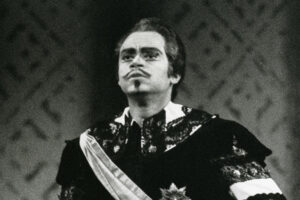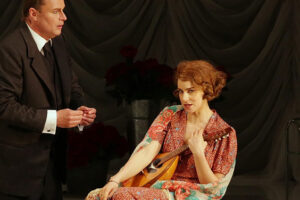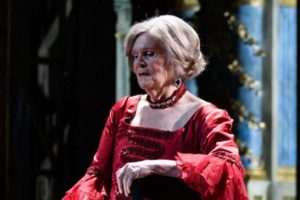

The now-retired and much-loved Nathaniel Merrill–Robert O’Hearn Met production lasted nearly 50 years being performed over 150 times in the house and more on tour. Set in the prescribed 18th century, it was a solidly traditional approach that served the Met well and never failed to win gasps and enthusiastic applause when the curtain rose at the beginning of the second act to reveal the spectacular Faninal mansion.
Like many versions mounted today, Carsen instead moves the action to the time of the opera’s first performance: 1911. Military uniforms and firearms are ever-present, and the heavy-handed opening tableau of act II features two enormous cannons as Faninal has been transformed into a wealthy arms dealer.
Particularly disturbing was the cataclysmic image that ends the opera and overshadows Mohammed’s unexpected drunken stroll. Carsen clearly wants us to remember that just three years hence Archduke Franz Ferdinand of Austria’s assassination will forever change the lives of these often frivolous characters forever.
Much preferring Strauss in his more concise mode—Salome, Elektra, Ariadne auf Naxos, even Daphne, I’ve nearly always found Rosenkavalier to be a trifle blown up to elephantine proportions. There seems to be little at stake in its brittle comedy of manners and its rather uninteresting title character functions primarily as a foil for the more compelling Marschallin and Baron Ochs.
Carsen’s time-shift serves to give rather more gravity to the erotic hijinks by evoking an increasingly decadent society unaware that it is about to be destroyed. I was reminded more than once of Jean Renoir’s magnificent film La Règle de Jeu which chronicles a similar doomed freefall.
This is not to suggest that Carsen’s Rosenkavalier becomes an oppressively dark and depressing journey. Indeed much of the staging is rather traditional although more overtly sensual than the staid Merrill version. The first act opens not with the Marschallin and Octavian lolling in bed but rather in the hallway outside her bedroom where the lovers escape for a post-coital smoke but are soon at it again eagerly rolling around on the floor.
Ochs’s compulsive manhandling of both Mariandl and Sophie verges on attempted rape, and Octavian and Sophie end the opera not chastely contemplating their future but making out on the bed in the third act’s brothel.
And that wild bordello, overseen by the unctuous Innkeeper of Tony Stevenson decked out in outrageous drag, features a much-appreciated bawdy attempted seduction of Ochs by Mariandl. Decked out during the prelude in a loud floral dressing gown and racy garter belts by the institution’s whores, Octavian comes on like a voracious nymphet which completely unsettles the usually omnivorous nobleman.
This slapstick interlude is but one of the highpoints of Günther Groissböck’s revelatory Ochs, an unconventional yet utterly convincing interpretation of a role that often bores me to tears. For once, Sophie doesn’t immediately recoil from her new fiancé because of his looks; it’s only when his extravagantly boorish behavior crosses the line that she reacts with horror.

Although it still had its skittishly girlish moments, Erin Morley’s Sophie was more adult and womanly than usual, and it was she who led Octavian to recline on the bed during their lush final duet. Both there and in the heavenly “Presentation of the Rose” Morley’s seraphic high soprano floated lustrously and blended divinely with Elina Garanca’s warmer earthy voice.
The Latvian mezzo has claimed that these performances will her final ones as Octavian which is too bad as she brings an elegantly regal bearing to the impetuous Count. She also showed an impeccable comic flair entering into the Mariandl persona with real panache particularly in her smoldering Dietrich-ish entrance in the third act replete with top hat and cigarette—and there are LOTS of cigarettes throughout the show!
As Garanca’s voice is growing as she moves into a heavier repertoire, one had the sense all evening that she might be holding back a bit as not to overwhelm her smaller-voiced female colleagues.
The Met has strongly cast this new production with debuting Markus Brück as a vibrantly sung Faninal, initially bristling with braggadocio but eventually mousy and defeated. Alan Oke’s particularly pungent Valzacchi was well paired with the spirited Annina of Helene Schneiderman (also a debut) who unfortunately sounded a bit thin and pinched.
Sophie’s duenna Marianne often squawks noisily while heralding Octavian’s approach but Susan Neves’s big soprano instead rang out impressively. A third debutant Scott Conner made an imposing Police Commissioner and, in a glamorously spotlit guest appearance, a ringing Matthew Polenzani radiated fulsome italianità as the Singer.
Unfortunately the role of the Princess Werdenberg which dominates the first act has become over-freighted with such legend and expectation that it’s difficult for any soprano, particularly one nearing the end of her operatic career, to enjoy a complete success. Despite her long-standing and sterling credentials as a Strauss singer, I remain unconvinced that the Marschallin is the best fit for Renée Fleming.
Thursday’s premiere was the third time I’d heard the soprano in the role at the Met—the first in 2000 was vague and unmoving. Although she beautifully negotiated the role’s high-lying music, the many important conversational exchanges failed to come across. Her 2009 assumption opposite her longtime Octavian Susan Graham and Miah Persson’s Sophie was more pleasing, played with a touching dignity.
As guided by Carsen, her favorite director, Fleming gave an earnest portrayal but one that also exposed her chronic shortcomings as a stage creature. While the initial interchanges with Octavian swelled with convincing languor, her bantering repartee with Ochs lacked wit and sparkle and the all-important monologue was heavy and unconvincing.
Perhaps admitting defeat, Carsen staged the entire levée with Fleming’s back to the audience! He did craft for her a marvelous act I exit during which the Marschallin soulfully dons her coat and hat and slowly leaves for church.
The Marschallin’s usually sure-fire grand third-act entrance went for little although Fleming looked smashing, but the regal hauteur that one expects here never materialized though wistful resignation came more easily to her. But Carsen having her pass by Octavian and Sophie kissing on the bed as she left made for an unnecessarily painful moment.
The upper part of the voice remains in very good shape if a bit careful and reduced in size and there was far less scooping and swooping than had once been the case. The “silberne Ros’n” at the end of act 1 was ravishing as was the final trio where she joined Garanca and Morley in an utterly transporting, time-stopping moment, a mere 21 years after she first sang that music at the Met during the Levine Gala.
But it must be said that since much of the Marschallin’s music lies low so she has to push into her weaker middle and growly lower registers where the sound can get a just bit ugly as in the second “ja” of her final iconic “Ja ja”.
Conductor Sebastian Weigle accompanied his diva with an occasionally indulgent baton but otherwise led a sumptuous, fleet reading of the rich score which included the standard stage cuts. One had little reason to regret James Levine’s withdrawal from this new production. Except for a few stumbles during the “Presentation of the Rose,” the orchestra played beautifully particularly in the vividly orgasmic opening pages.
Carsen’s able collaborators included Paul Steinberg whose striking first-act set for the Marschallin’s expansive red-walled bedroom covered with forbidding male portraits (most likely of the Prince’s ancestors) was wittily mirrored in the third-act bordello which contained a nearly identical bed—this time a Murphy-model uproariously revealed by the faux-horny Mariandl.
The costume designer Brigitte Reiffenstuel contributed many grey uniforms for the men in addition to some striking ladies outfits, particularly for the stylish impromptu fashion show during the levee. Philippe Giraudeau’s elegant choreography for eight couples accompanying the “Presentation of the Rose” was more distracting than helpful.
All in all, one must be grateful to Fleming whose “maybe-maybe not” Met farewell prompted this intriguing and much-needed new Rosenkavalier. The rather vociferous booing that greeted the production team frankly surprised me; I wasn’t initially convinced but the flair and seriousness of Carsen’s work eventually won me over.
One does wonder how it will play though during subsequent revivals particularly without the stupendous Groissböck as Ochs. But in the meantime eight more performances remain (although two feature Kathleen Kim as Sophie instead of Morley) with an HD transmission scheduled for May 13.
Photos by Ken Howard/Metropolitan Opera.
























Comments